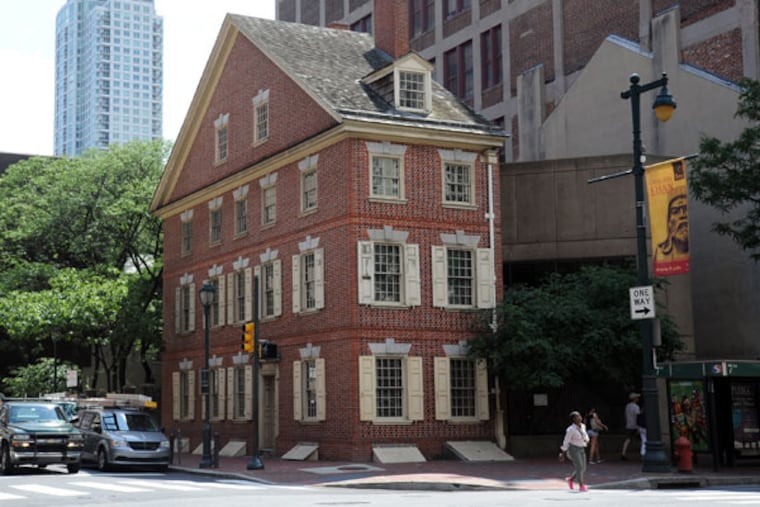This Fourth of July, America needs to remember its founding principles | Opinion
Human equality requires that we treat others as we would have them treat us. And in this, we have failed.

It’s not fashionable these days to remember the birth of the United States some 244 years ago in Philadelphia. Instead, we fixate on mobs laying waste to statues, blameworthy Confederates and praiseworthy abolitionists alike. Getting all the facts straight doesn’t seem to matter anymore. Those too genteel to topple statues busy themselves with the intellectual equivalent: passing judgment from behind their keyboards over who should be expunged from American history, and who is clean enough by 21st-century standards to remain in the public’s good graces.
Given the public’s recent trouble with the finer points of American history, a refresher course on the document that birthed a nation is in order.
The story begins on June 11, 1776, when the Continental Congress appointed a committee of five, Thomas Jefferson, John Adams, Benjamin Franklin, Roger Sherman, and Roger Livingston, to draft a declaration of independence. The committee appointed Jefferson, 33 years old at the time, to produce the first draft.
Jefferson retired to the house of Jacob Graff on the southwest corner of Seventh and Market Streets in Philadelphia, where he rented the second floor and produced the first draft of the Declaration of Independence. The committee, and then Congress, altered the draft 86 times. But the declaration remained Jefferson’s creation. And with Jefferson’s document at the center of the debate, independence from Great Britain was approved on July 4, 1776.
The occasion was so momentous that, four score and seven years later in his Gettysburg Address, Abraham Lincoln would date the birth of the nation to it. Other dates might have been better: Sept. 3, 1783, the date the Treaty of Paris was signed, ending the Revolutionary War; or Sept. 17, 1787, the date the Constitution was signed at the Federal Convention, creating the constitutional republic under which we still live. But Lincoln chose the aspirational date, the date that independence was declared and the reasons for it laid out in clear argument. He was right to do so.
» READ MORE: The 1619 anniversary: Where does the American story begin? | Opinion
The Declaration of Independence was without question a perfect statement of principle in 1776. But to conclude that the document applied only to that time is to risk misunderstanding the declaration and the country that flowed from it. It has become fashionable in our day to dismiss not only the man but the words of the man in one fell swoop. So as statues of Jefferson come down, either by mob action or by more deliberative efforts, his words come under attack, too. But hypocrisy — even the rank hypocrisy of Jefferson having enslaved people — is no reason to dismiss something we know to be true. The message, as is often the case, is stronger than the messenger.
Thomas Jefferson did not offer an 18th-century truth in the declaration. He offered timeless truth. His thinking remains far more powerful than his present-day detractors would admit. Indeed, that truth is so powerful that it has arguably animated every revolutionary movement from his day to ours.
That message? Jefferson wrote: “We hold these truths to be self-evident that all men are created equal.” These were brave words indeed, from a blameworthy slaveholder. And because of the truth contained in those words, just four score and seven years later, slavery was finished in the United States.
» READ MORE: The Philly home where the Declaration of Independence was born
“The message, as is often the case, is stronger than the messenger.”
All men are created equal.
The United States was and remains the only nation in the world founded on a principle. And we rise and fall by our fidelity to that principle.
It is not enough that human equality requires us to be tolerant of each other. Human equality also requires that we be decent toward one another. It requires all of us to acquiesce to the rule of law. It requires us to play by the rules and to abide by elections, seeing the best in our opponents, safe in the knowledge that they will see the best in us when they emerge victorious in the next election, or the one after that.
Human equality requires that we treat others as we would have them treat us. And in this, we have failed. There can be no better time than now for people on all sides to take a long, hard look at themselves and to aspire to be better. The birth of our nation was itself an aspiration, and there is still time to live up to it. On the 244th anniversary of American independence, we can pledge this to each other, just as the signers of the Declaration of Independence pledged to each other their “lives, fortune, and sacred honor.” It’s only fitting.
Antony Davies is an associate professor of economics at Duquesne University. James R. Harrigan is the managing director of the Center for the Philosophy of Freedom at the University of Arizona. They host the weekly podcast, Words & Numbers.